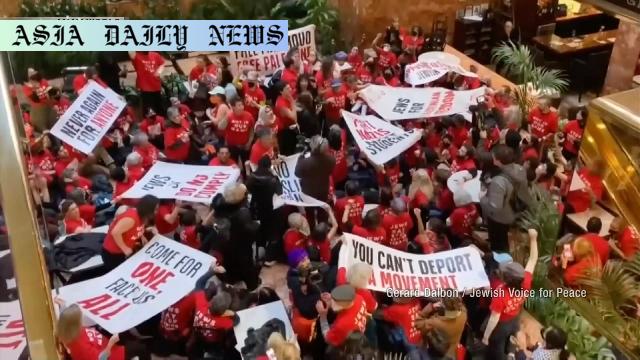Protesters: Jewish Voice for Peace condemns Trump administration over arrests related to pro-Palestinian activist protests.
Nearly 100 protesters arrested at Trump Tower during demonstration opposing Israeli military actions in Gaza.
Jewish Voice for Peace organized the event, criticizing President Trump’s anti-Semitism policies and DHS actions.
The detained activist has been a mediator in past pro-Palestinian university protests, stirring ongoing demonstrations.

Introduction: The Arrest of Protesters at Trump Tower
The arrest of 98 demonstrators at Trump Tower in New York has drawn both national and global attention. The protesters were participating in an organized effort by Jewish Voice for Peace to voice opposition to the Israeli military’s ongoing attacks in Gaza. Their demonstration also centered on the detention of a former Columbia University student, reportedly taken into custody as part of US President Donald Trump’s executive strategies targeting anti-Semitism. The arrest has sparked debates not only about activism but also about student rights, the role of government policies, and how anti-Semitism is addressed in the United States.
Details of the Demonstration and Arrests
The gathering within the Trump Tower lobby involved members of Jewish Voice for Peace, a grassroots organization aiming to address social justice through the lens of Jewish ethics. Police intervened swiftly, arresting 98 individuals among the demonstrators. According to law enforcement, the protests in New York are part of a string of rallies held daily demanding the release of the detained activist. The individual in question previously served as a mediator at Columbia University during pro-Palestinian demonstrations in 2022. His arrest has not only amplified calls for justice but also exposed fractures in how both the Trump administration and the Department of Homeland Security (DHS) approach perceived anti-Semitic activities. This development adds to rising tensions in New York and other urban areas.
Legal and Social Implications
The arrest has highlighted the complex landscape surrounding free speech, activism, and governmental authority in the United States. Critics, including many from Jewish Voice for Peace, argue that the Trump administration’s policies are not genuinely interested in protecting Jewish citizens but are instead leveraging anti-Semitism to advance political objectives. For instance, the detained activist was labeled negatively by President Trump in a public social media statement, where he criticized “pro-terrorist” behavior. Such rhetoric raises concerns regarding potential bias, as well as the line between security measures and suppression of dissent. The narrative surrounding this arrest sheds light on significant divides over strategy, governance, and social justice.
Reactions from Activist Groups and Public Opinion
Jewish Voice for Peace has positioned itself at the forefront of countering these arrests, condemning what they see as the manipulation of anti-Semitism to justify suppressing legitimate political dissent. The ongoing demonstrations across New York reflect broader public concerns over the erosion of civil liberties. Historically, activism aimed at supporting Palestinian causes has faced skepticism, especially within the United States, but such demonstrations showcase a determined effort to demand accountability for governmental actions. The convergence of pro-Palestinian advocacy, campus activism, and broader concerns about US policy points to an enduring challenge in balancing national security with ensuring freedom of expression.
Conclusion: A Turning Point for Activism
The arrest of nearly 100 protesters at Trump Tower underscores a key moment in the ongoing debate over the intersection of activism and politics. As rallies continue daily in New York, the broader implications of such arrests are expected to be a rallying point for advocates, highlighting the enduring divide over government accountability and civil liberties. The tension between groups like Jewish Voice for Peace and the Trump administration remains a topic that will shape discourse around activism, law enforcement, and governmental strategy for years to come.
Commentary
The Complexities of Activism in America
The recent arrests of protesters in Trump Tower present a nuanced view of how activism intersects with governance. One cannot ignore the sheer scale of opposition organized by Jewish Voice for Peace, a grassroots initiative aiming to amplify marginalized voices. Their presence at such a high-profile venue underscores the determination of these protesters to challenge policies they view as unjust. A closer look reveals a fundamental clash between civil liberties and governmental authority, particularly when issues such as national security and anti-Semitism are brought into the mix. This clash is a recurring theme in recent history, but the handling of pro-Palestinian demonstrations brings unique challenges that require thoughtful discussion.
The Role of Rhetoric in Political Narratives
President Trump’s strong rhetoric, exemplified by labeling the detained activist as a “Radical Foreign Pro-Hamas Student,” adds another layer of complexity. While political statements are a norm in democracies, such characterizations can further polarize the public and discourage meaningful debate. The implication that activism aligned with Palestinian causes is inherently anti-Semitic or un-American is both dangerous and simplistic. It undermines the legitimate concerns raised by advocacy groups, redirecting attention away from the core issue—namely, accountability for actions taken domestically and internationally. Political rhetoric has significant influence over public behavior, and a more measured tone could pave the way for more constructive conversations.
An Opportunity for Reflection on Civil Freedoms
Ultimately, the events at Trump Tower remind us of the fragile balance between exercising freedoms and maintaining societal order. As protesters continue their efforts, it falls to policymakers and the broader public to engage thoughtfully with the issues raised instead of dismissing them or resorting to reactive measures. The arrest and surrounding discourse are an opportunity for introspection, not only about who is being targeted by policies but also how these policies reflect national priorities. Maintaining open channels for dialogue remains a critical ingredient for democracy to thrive amidst disagreements.


